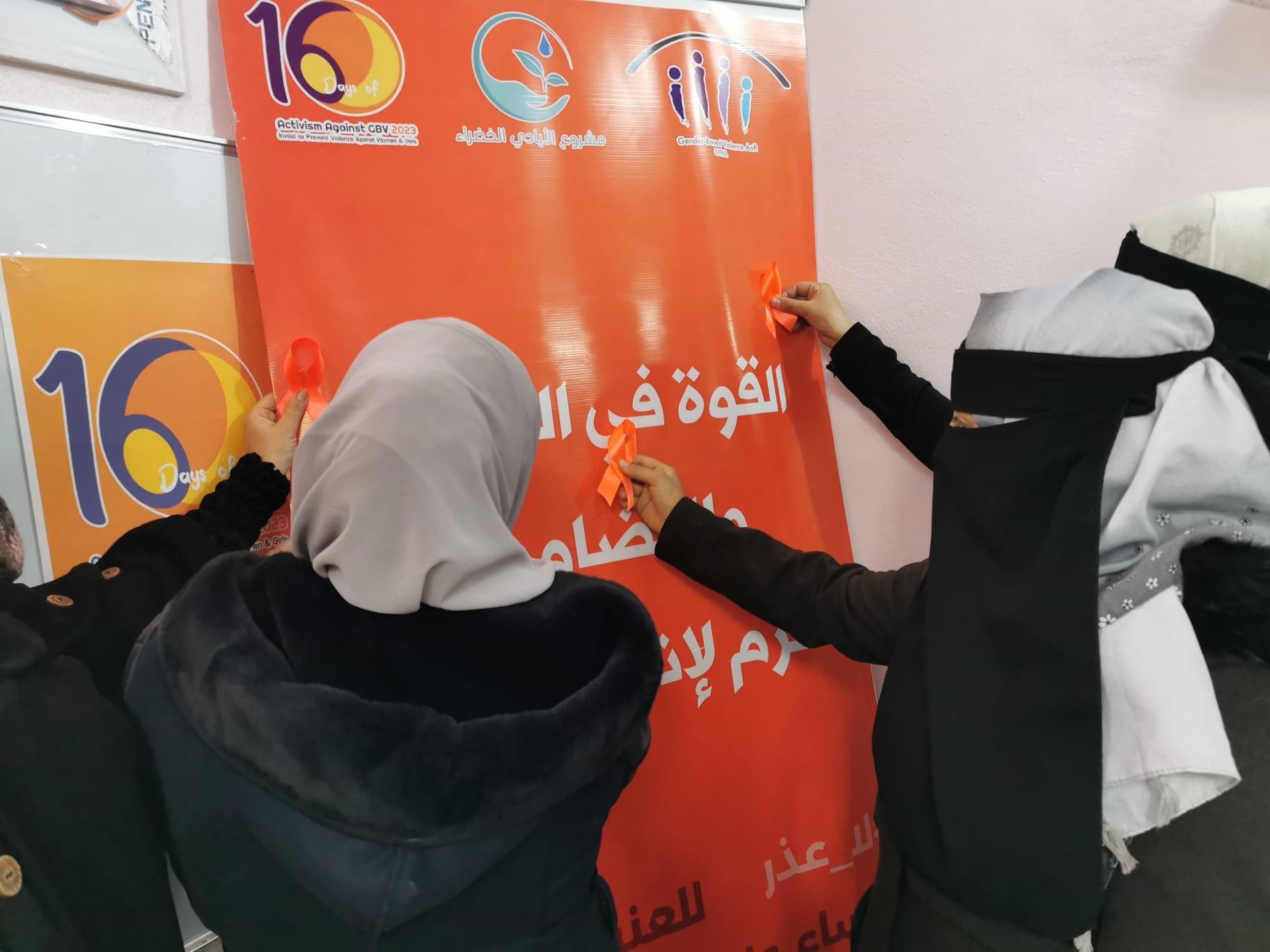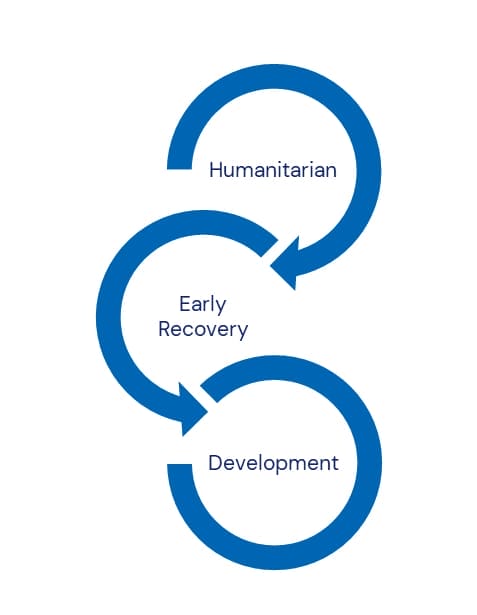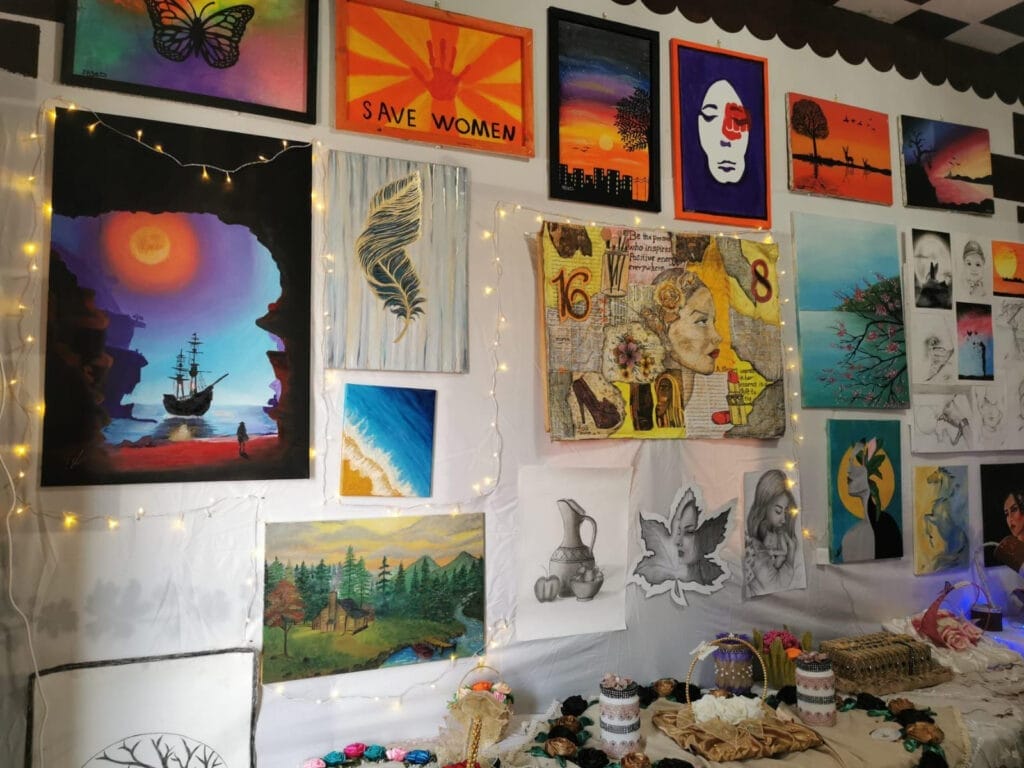News > Blog
Preventing and Responding to Gender-based Violence in Humanitarian Settings
Published 12/08/2023 by Global Communities

By Emily Galloway, Sr. Advisor for Global Protection, Global Communities
Gender-based violence (GBV) is a pervasive issue that disproportionately affects women, girls and vulnerable individuals during emergencies. In disaster or conflict-affected areas, gender inequalities and power dynamics can both exacerbate existing risks of GBV and create new ones. While risks are always context-specific, we see many similarities in different crisis settings, from Ukraine and Syria to the West Bank and Gaza.

There are also GBV risks related to humanitarian interventions, which are often designed by men, lack gender and safety considerations, and underprioritize the unique needs of women and girls.

Our Approach

Global Communities works in humanitarian settings around the world and implements GBV in Emergencies (GBViE) programming in several countries. We use this approach to respond quickly to new and worsening GBV risks for women, girls and other vulnerable groups. GBViE is a lifesaving and important component of our emergency response and humanitarian programs.
While we tailor our responses to the unique risks and needs of crisis-affected populations, we implement several standard GBViE activities. For example, during the onset of an acute emergency, such as an earthquake or recent displacement, we focus on lifesaving services that address women’s and girls’ immediate safety needs. We also use conflict- and gender-sensitive approaches to adapt our existing programs. While responding to protracted conflicts, we tend to prioritize work with community-based structures to empower women and improve the overall protective environment for them.
Responding to GBV in the West Bank and Gaza
Much of the world is currently watching and responding to the unfolding crisis in the Middle East. On October 1, 2023, Global Communities initiated its Pioneers-Raedat Project — a five-year initiative to promote the empowerment of women in the West Bank, Gaza and East Jerusalem. A week later, on October 7, Hamas attacked Israel and Israel declared a war against Hamas. These events have led to a devastating humanitarian crisis for civilians in Gaza and changed the context for which Pioneers-Raedat had been designed. Women and girls are disproportionately affected by the conflict, facing significant threats to their lives and safety, including increased GBV concerns.
- One-third of those killed are women and children.
- There are 50,000 pregnant women in Gaza, with approximately 5,522 expected to deliver in the next month; they face dramatically reduced access to maternal and newborn care.
- 788,800 women and girls have been displaced from their homes.
- 2,056 women have recently become widows or the heads of households.
- Overcrowding and a lack of water and sanitation is impacting women’s menstrual hygiene practices.
- Queues for bread are over 5 hours on average and essential food items are almost depleted.
In acute emergencies, such as in Gaza, the extreme security threats, lack of services and deterioration of family social support networks raise a variety of risks. For example, overcrowding in shelters for displaced people increases the risk of physical or sexual abuse. The extreme lack of access to basic commodities, such as food, increases the risk of exploitation and abuse as women try to provide for themselves and their families.
In this context, Global Communities is modifying existing programs to address some of these risks. Currently, it is still extremely difficult for non-governmental organizations to access Gaza and deliver aid. The frontline staff, who would implement such activities, are focused on protecting their families, while experiencing significant trauma.
There is a significant impact in the West Bank as well, with increasing safety concerns, movement restrictions and psychological distress linked to the suffering in Gaza. Moreover, economic deterioration is making life more difficult for women there. We are poised to respond to this situation with immediate response activities, including:
- Gathering information about protection and GBV risks and needs.
- Responding to immediate protection needs with cash and dignity kits containing hygiene and sanitary items.
- Mapping available GBV and protection services, and helping women access them.
- Disseminating key messages about emerging risks and protection strategies.
- Providing basic Psychological First Aid to prevent further traumatization.
- Advocating for GBV risk mitigation practices, such as safe and gender-responsive distribution of aid.
- Planning for the next phase of psychosocial support sessions, safe spaces for women and girls, and case management for GBV survivors.

It is important to view these different types of activities and contexts along a spectrum. Immediate and well-coordinated efforts are essential to mitigate the impact of the crisis on women and girls. Humanitarian actors, like us, need to prioritize their safety, well-being and dignity. This lays the foundation for early recovery and development efforts that will focus on promoting women’s resilience and agency.
Implementing gbviE in other Contexts
Global Communities implements GBViE in other contexts too, including Syria and Ukraine, which have unique GBV risks and response needs. For example, for the past seven years we have been providing GBViE services in the displaced persons camp in northwest Syria, where there are no services provided by local institutions. Because the civil society in this region is still weak, Global Communities is the primary service provider, implementing a comprehensive, geographically concentrated approach to fill a range of service needs in a community prioritized based on the level of need and vulnerability.


In Ukraine, Global Communities implements GBViE through local partners under the Community-Led Emergency Action and Response (CLEAR) program. This project includes capacity strengthening and mentoring of local organizations to increase their ability to respond to the crisis. The government of Ukraine continues to provide services through local institutions in many parts of the country. Local civil society organizations, which were strong before the 2022 escalation of the conflict, have pivoted to providing humanitarian response. In this situation, Global Communities fills specific geographic and service gaps, and supports local actors, which had no humanitarian experience prior to Russia’s full-scale invasion. These organizations are eager to build on their previous experience to better serve their communities in this crisis.
In all these crises, Global Communities provides tailored packages of services for women and girls. Addressing GBV must always be “localized” and built on the priorities and preferences of those most affected – women, girls and other vulnerable individuals who are at risk of or have experienced GBV. GBV is a sensitive, personal issue that is felt uniquely by those affected. We will continue to work with women, girls and their communities to support a reduction in violence they face and a realization of their human rights.



